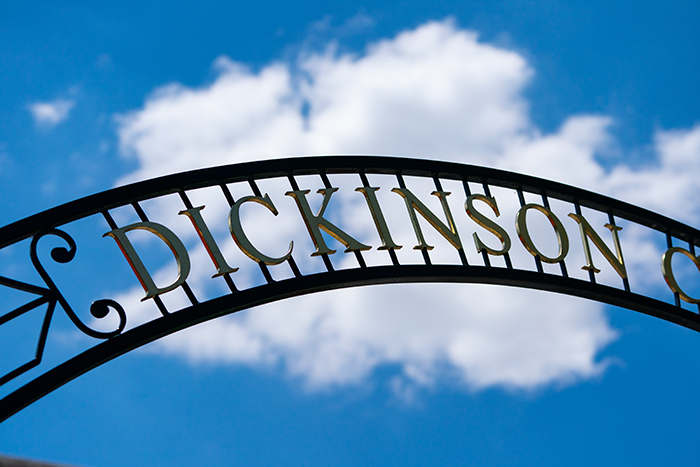Dickinson Unveils Inclusive Language Style Guide, Diversity Calendar

The Dickinson College arch.
College launches valuable online tools
by MaryAlice Bitts-Jackson
Language is always evolving, as new words are added to dictionaries each year and new conventions take hold. That’s even more true in recent years, as global social-justice movements have sped up the evolution of identity-related language, such as the growing use of “they/them/their” as a gender-neutral, singular personal pronoun.
How, then, can people of good faith ensure that the language they’re using is up-to-date and respectful? Dickinson’s Inclusive Language Style Guide is here to help.
Inclusive language: signaling respect
The Inclusive Language Style Guide is an online tool to introduce students, faculty and staff to current best practices in inclusive language so they can speak and write effectively in a way that signals respect.
“It’s not a tool to police language, but a very valuable resource for students, faculty and staff,” explains Amy McKiernan, professor of philosophy, director of Dickinson’s ethics across the curriculum program and a member of the EIB communications committee, who’s already alerted students to the guide and referenced it in class.
Entries are divided into four categories: Abilities and Disabilities; Faith, Religion and Spirituality; Gender and Sexuality; and Race, Ethnicity and Nationality. Each section includes a sampling of commonly referenced entries written by the Equity, Inclusivity & Belonging (EIB) all-college committee, under advisement of subject experts in Access & Disability Services, Marketing & Communications, the Popel Shaw Center for Race & Ethnicity, the Center for Spirituality & Social Justice and the Women’s & Gender Resource Center. The guide includes a list of vetted additional resources as well.
“The Inclusive Language Style Guide is a great tool to help us all in communicating in a more inclusive way as we act on our commitment to recognizing and respecting one another through the language we use,” says Angie Fernandez Barone '90, P'22, P'23, P'26, chairperson of the EIB communications committee, which spearheaded the project. “And, as recommendations for inclusive language evolve, the page will be updated so it’s a tool that we can all return to and learn from over and over again.”
Making events easier to find
And the opportunities to learn and build a more just and inclusive campus and world don’t end there. The EIB has also recently unveiled a Diversity Calendar to update the college community on diversity and inclusion-related events. These include events that focus on education and training, and on social and community-building events, including those specifically designed for students who identify as part of historically marginalized groups.
The calendar is intended to make it easier for Dickinsonians to quickly find upcoming events designed to educate and build community around the themes of diversity, equity and inclusion during the academic year. It’s also a visible reminder of the many ways Dickinsonians can and do approach this vital work on campus.
“I think tools like this provide students across the campus access to information that allows them to grow,” says Deon Rosado ’24, a political-science major who serves as student representative on the EIB communications committee. “Not only do we get to gain knowledge in the classroom, the Inclusive Language Guide and Diversity Calendar pushes the student body to see what can be."
Planning inclusive events
Finally, as a partner project, the EIB’s Voice, Visibility, and Participation of Underrepresented Dickinsonians committee created an Inclusive Events & Programs Guide, available on Dickinson's Diversity page, to help campus community members plan inclusive events. The guide outlines helpful tips on planning the event, selecting and securing a venue, accessible setup, providing food, advertising and more.
“The guide is not meant to act as a checklist, but instead provides guidance for those who want to make sure they are accommodating everyone that might be part of their audience,” says Todd Nordgren, director of the Office of LGBTQ Services and a contributing faculty member in women’s, gender & sexuality studies. “We hope everyone at Dickinson will connect with experts on campus if they have questions about the guidance as we all learn to create our campus events and programs more accessible and welcoming.”
TAKE THE NEXT STEPS
Published June 14, 2023